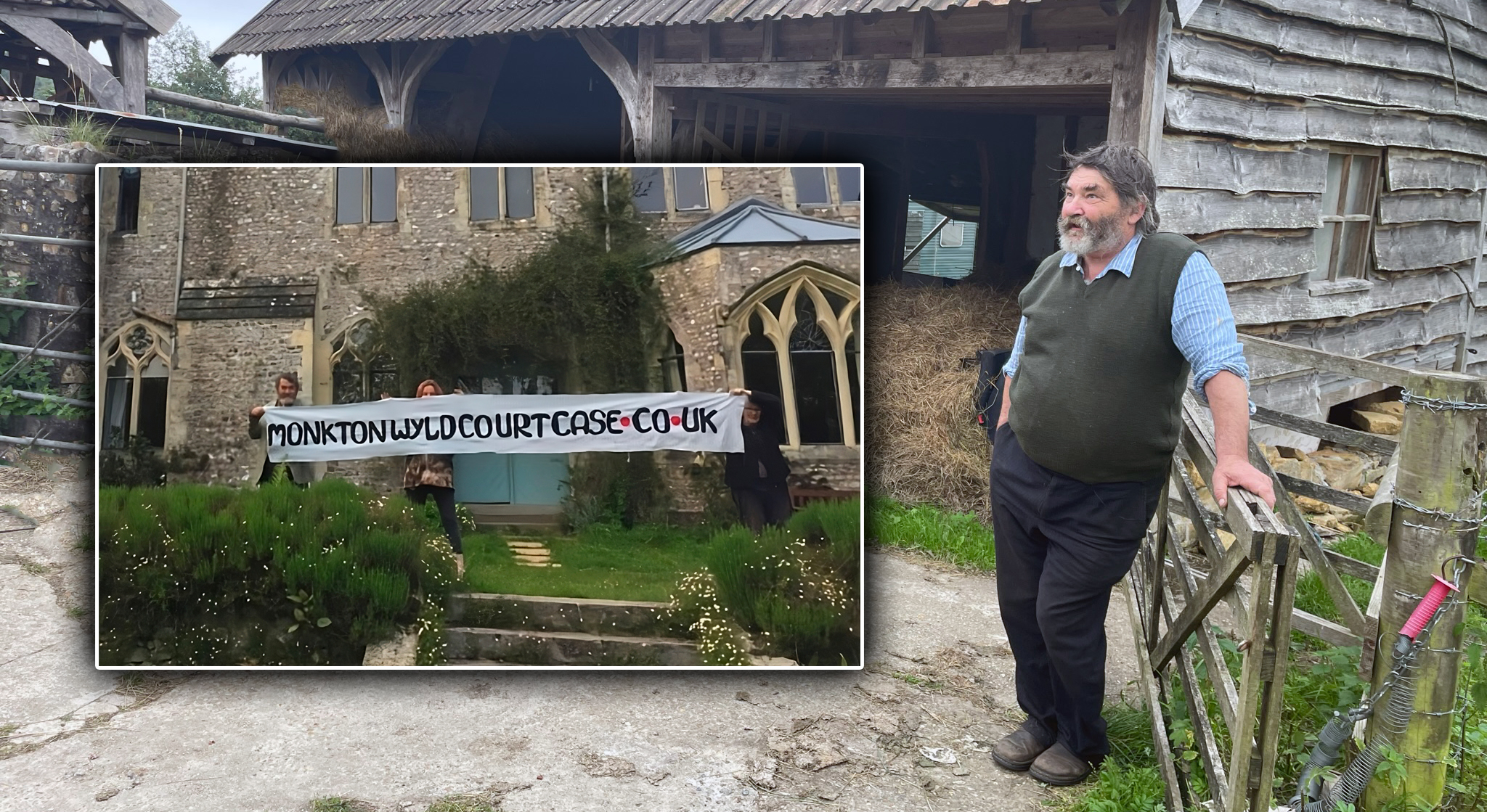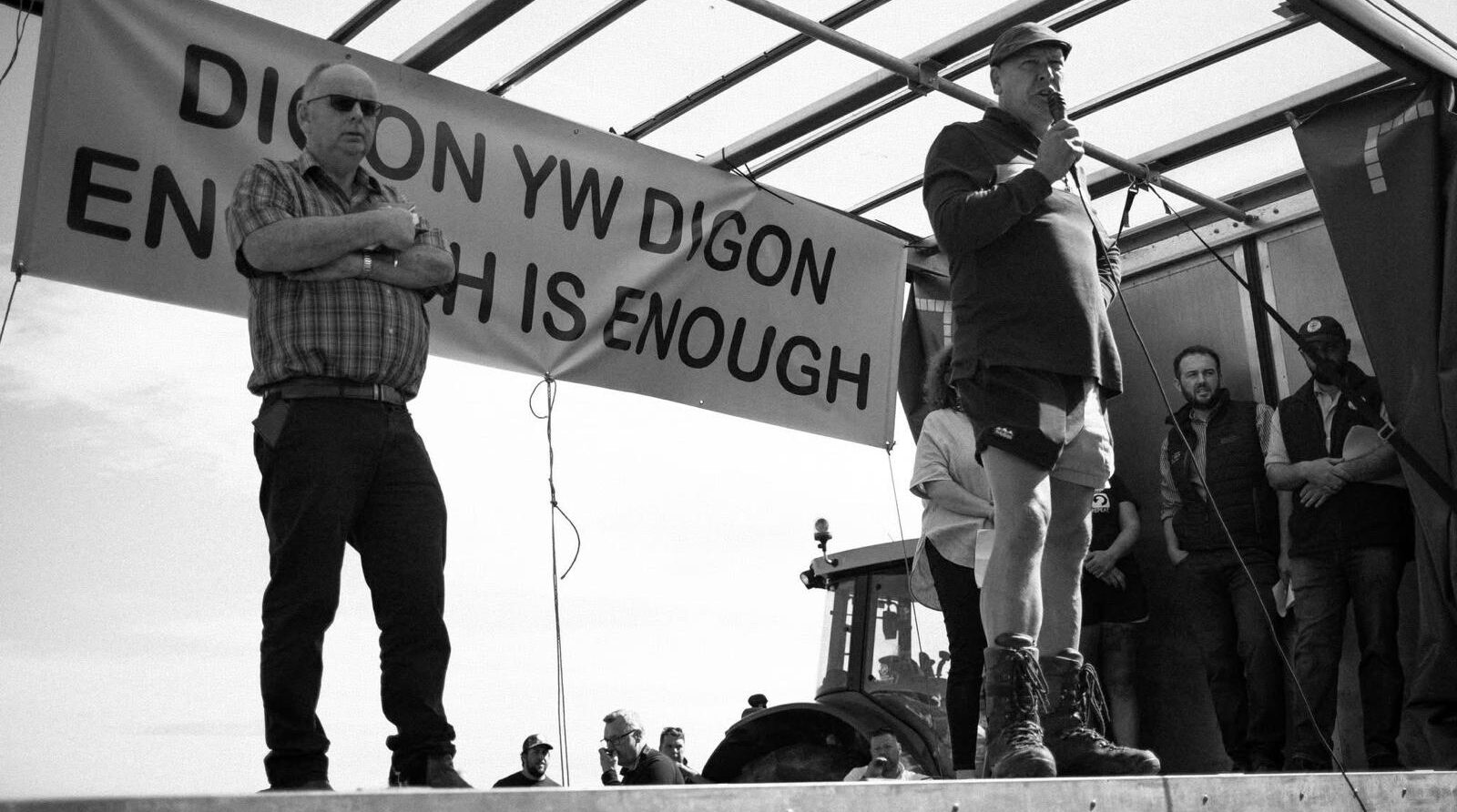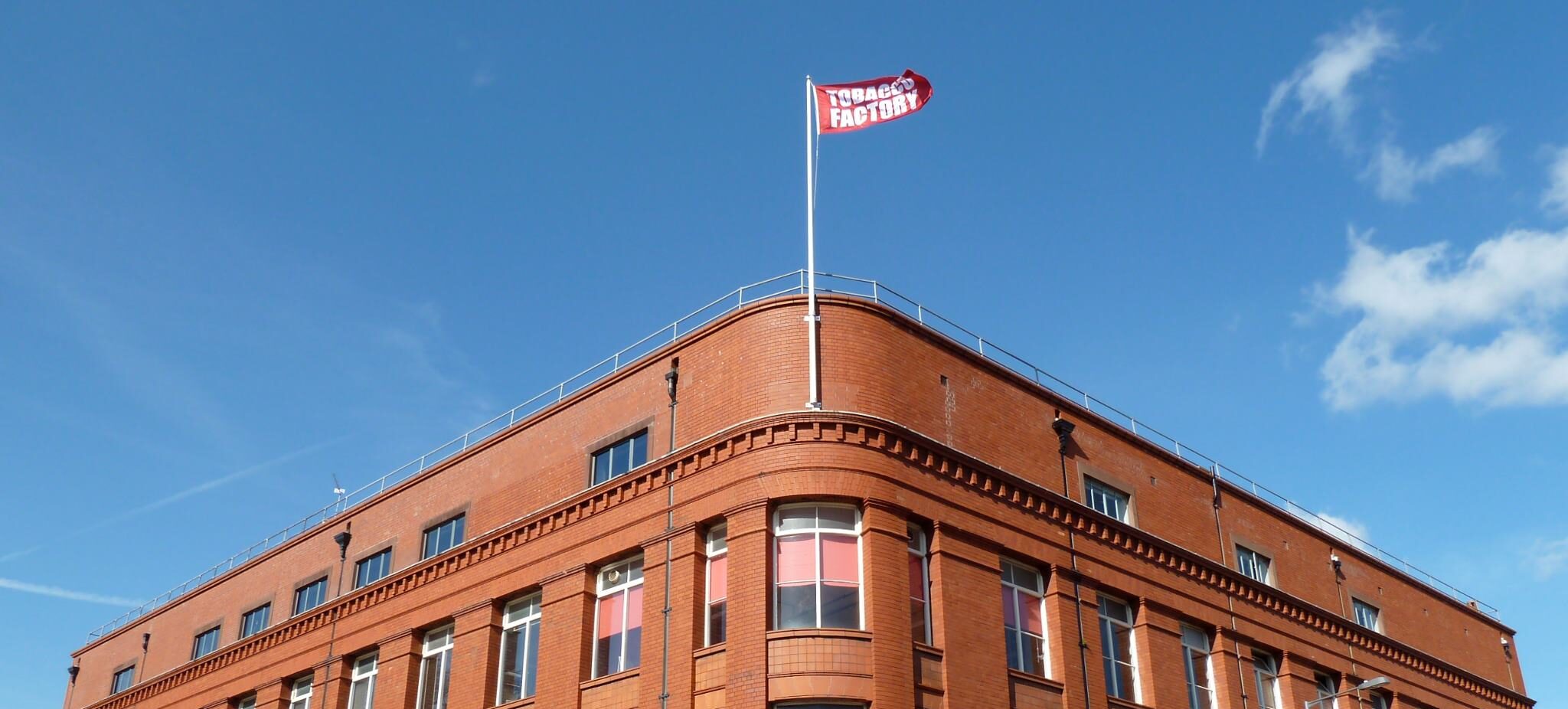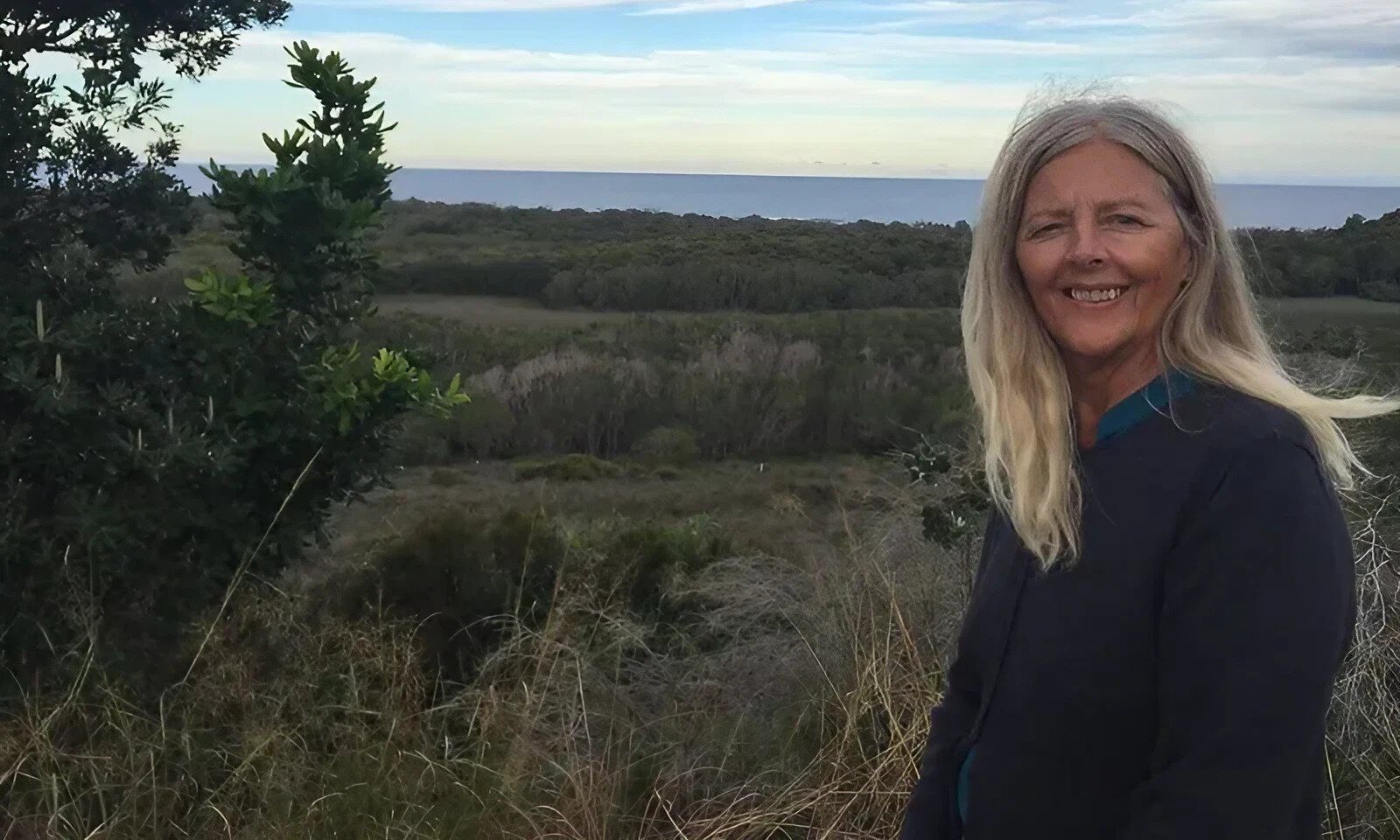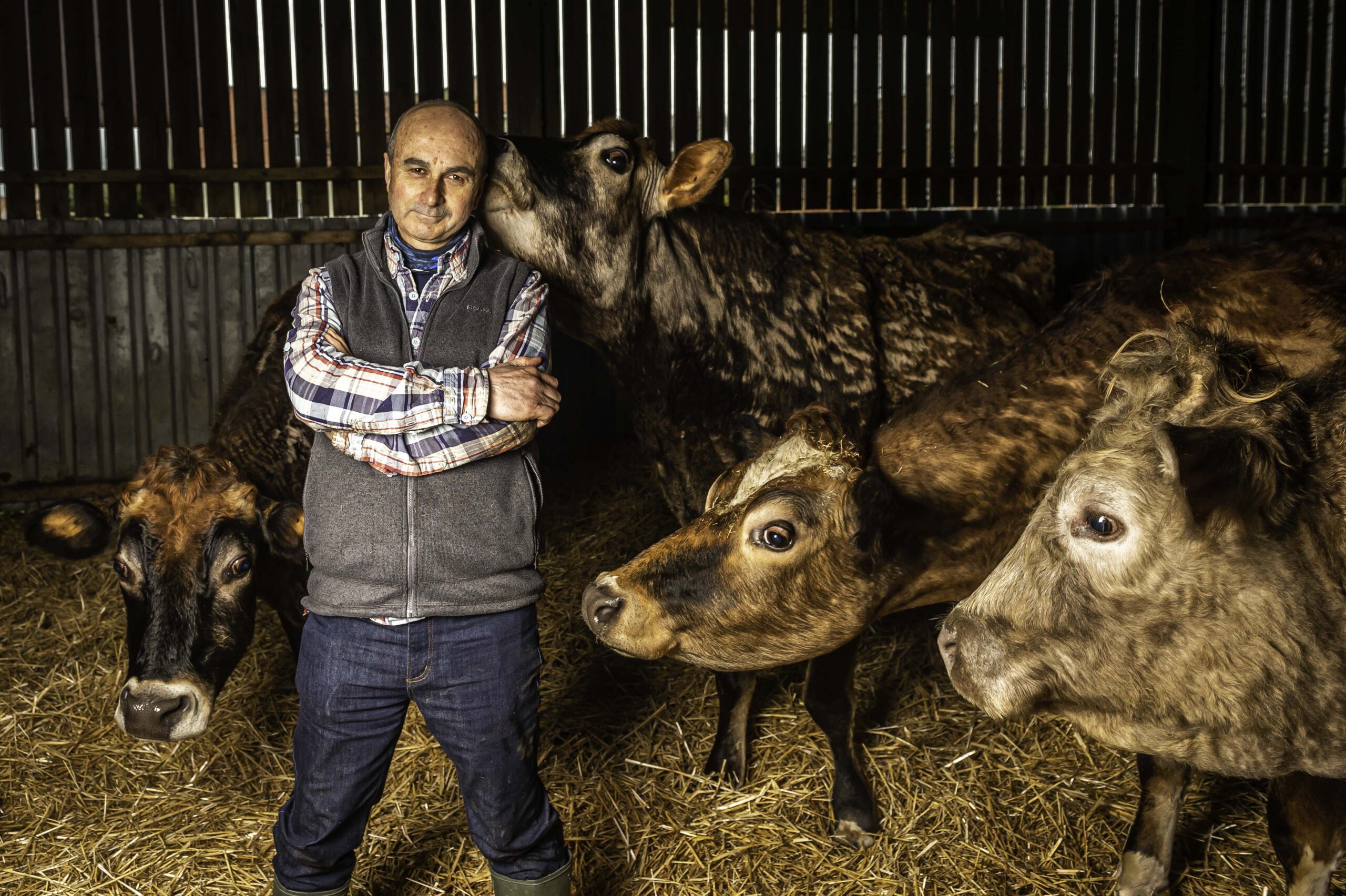2m Short Version
11m Full Version
The story of Simon Fairlie’s life as a rebel guru began in the early nineteen-seventies when he lost patience with his studies at Cambridge and dropped out to hitchhike to Istanbul and then to travel across India by bicycle.
His father Henry Fairlie, a well-known journalist and social critic, wanted Simon to become a mainstream journalist like himself. He had re-invented the term ‘the Establishment’ to describe the small number of people who control Britain. ‘The exercise of power in Britain cannot be understood unless it is recognised that it is exercised socially,’ he wrote.
Since then Simon has been engaged in a creative rebellion against the establishment and the principles that underpin it, particularly in the context of food and farming. His message is that we’ve made so many terrible mistakes, we have to go back to the traditional principles of farming and start again.
His ideas are far from outdated; eighty percent of the population of Africa are fed by small scale farmers who manage the soil, water, seeds and sunshine in the same way as they have done for millennia. The industrialisation of African agriculture as promoted by Bill Gates et al is a colonial project designed to exploit Africa’s land for cash crops, to destroy local agriculture, and to feed global corporate profits instead of people.
Simon’s 2022 autobiography, Going to Seed – A Counterculture Memoir, tells the story of a life of protests, living in communes, smallholder farming and writing, beginning with how his father’s hopes for him to follow a Fleet Street career came up against the much more attractive counterculture movement of anti-war activism, poetry, protests, music, cannabis and most importantly freedom from wage slavery – ‘a career is a headlong rush towards doom,’ Simon wrote.
COMMUNES
A year after his journey across India he and some friends decided they would try and create a land-based alternative to the increasingly competitive and consumerist culture of the early seventies, and after failing to find any affordable land in England, they were able to buy four acres in the South of France for the princely sum of £600.
“So all four of us bundled into this Ford trader van, filled it full of sacks of wheat and wheelbarrows and God knows what and we trundled off down there and started building these God awful shacks because we weren’t very good at building. It was just so easy. We weren’t very good at producing veg, but more important in terms of self-sufficiency was just having a space, being able to build your own house, your own sanitation, your own water, your own fuel from the wood and so forth. Basically being independent.”
Their electricity came from the spare battery for their Citroen 2CV that powered lights and music, and they spent 10 years living a simple independent off-grid lifestyle until they closed up the farm and headed back to England.
While doing some jail time in the nineteen eighties for squatting, his cellmate told him about some land for sale in Somerset. He and some friends raised enough to buy the land and they founded Tinkers Bubble. It’s an off-grid community that still exists today, making a living for six families from 28 acres of mixed woodland that they harvest with a steam-powered sawmill, from horse-ploughing the organic garden, pressing apple juice and fermenting cider.
“It’s the only piece of land I’ve ever seen that has nothing wrong with it, it’s got trees, its got orchards, its got grass, its got water right at the top of the hill in the centre of the property”, Simon says. The community aims to be self- sufficient, and to have a very light footprint on the Earth. The houses are built from materials that biodegrade naturally, so if the community moves away, they will be absorbed back into the soil they came from.
PROTESTS
In 1991 he joined the protests against the construction of the M3 motorway that was bulldozing through a chalk downland in Hampshire called Twyford Down, destroying a pristine landscape rich in wildlife, flora and archaeology. After a series of direct actions that included living in trees and being chained to bulldozers, a group of seven that included Simon were arrested.
In what was to precede a series of judgements where environmental protestors were forgiven because the judge agreed with their motives, the judge at their trial said, ‘Nothing is more saddening than when a judge is faced with the unenviable task of passing prison sentences on people who are fundamentally decent and motivated by a concern which to them overrides everything else.’
However, in spite of that kindly remark, and because they broke the injunction not to revisit the protest site after only two days, he sentenced them to 28 days in prison. ‘You have been quick to snatch the martyr’s crown and you may find it is uncomfortable head-gear,’ he said.
MEAT
About ten years ago the BBC were producing a programme about meat and interviewed Simon about whether consuming meat was sustainable in terms of land-use and resources. He had already published his 2010 book, Meat – A Benign Extravagance and had given this matter a lot of thought. He told the programme that if we ate meat, not from factory farms but from sustainable methods of production, in other words from outdoor pigs and chickens, and from pasture grazed cattle and sheep, everyone would be able to eat up to 100 grams per day. Five days of fact-checking research by the BBC programme makers proved him right.
His leading argument in the book is that farming of animals for food has become an ecological and ethical problem because we are physically and spiritually disconnected from animals and the land. Factory farming, where stressed animals are inhumanely crammed into barren unhealthy sheds, is only possible if farmers have no empathy with the animals and look on them as units of production, like car parts. The huge concentration of animals means that the waste is an environmental hazard rather than a useful fertiliser, and antibiotics are used routinely, causing incurable antibiotic-resistant diseases that pass from animals to humans.
“We all want to see an end to factory farms and to specialist dairy farms with great slurry lagoons and so forth, but by proposing veganism you’re basically throwing the baby out with the bath water because you’re losing 12,000 years of symbiotic co-evolution between humans and animals and all the other plants and birds and mammals and so forth that share a mixed farming grassland environment which is what England does best.”
He argues that because animals are part of a fertility cycle it makes agro-ecological sense to include them in a mixed farm system where fertility is produced on the farm, not bought in as artificial fertiliser. In his 2017 article ‘Could a tax on meat help us save the planet?’ Simon suggested that meat should be given luxury status like ice cream, nuts and fruit juice and charged VAT to help offset the environmental costs of meat production. Small livestock farms with an annual turnover of less than £85,000 would be exempt, which means they would have a price advantage over supermarkets for any meat they sell direct to consumers.
KICKING AGAINST THE PRICKS
The Road Protests in the nineties were in part a reaction against the brutal, authoritarian extremes of the Thatcher years that saw violent police attacks on protests, gatherings and strikes, notably the infamous assault on Travellers at Stonehenge in 1985 that ended with dozens injured and 535 arrests. Thatcher declared, in an echo of Nazi Germany, ‘we must pass a law against these people’.
The idea that an independent, off-grid lifestyle is in itself a protest against, and an alternative to, the debt slavery of late-stage capitalism is embodied in the title of Simon’s talk at the Green Gathering last summer, ‘Kicking Against the Pricks’.
“Things happened at Twyford Down and all the other road camps and what this meant was that the protest became not only a way of protesting against the issues, the bombs and the cars and so forth, it also became an experiment in different lifestyles, and that was hugely important for all the people involved. People had to learn how to cooperate, how to work together, how to cook for each other, how to organise, and in a way it became the point where the medium was the message, that actually being on site and doing all this stuff was in fact creating the alternative society, or at least an image of the alternative society, that one wanted to create.
“When you look back, towards the end of a full life, you realise you have just been treading water – fighting a rearguard action for justice and ecological modesty against the forces of corporate greed and technological rapacity, who have wealth and power on their side. But we can keep a check on these idiots, and limit or delay their excesses.”
THE LAND

For the past eighteen years, lately in partnership with Gill Barron, Simon has been the editor and publisher of the Land Magazine, ‘an occasional magazine about land rights.’
‘The Land is written by and for, people who believe that the roots of justice, freedom, social security and democracy lie, not so much in access to money, or to the ballot box, as in access to land and its resources. Editorial policy… is to campaign peacefully for access to land, its resources and the decision-making processes affecting them, for everyone, irrespective of race, creed, age or gender.’
A scroll through the Back Issues section reveals a treasure trove, a museum of wisdom and knowledge carefully curated over the years to conserve philosophical, political and practical ideas about land use and country ways through the ages. Over the years The Land has built up a library of learned, historical, campaigning, agro-ecological and sometimes whimsical articles about issues that are crucial to our lives, our relationship with the land and our future. The Land is a compendium of priceless resources that would be difficult or impossible to find anywhere else.
The striking woodcut artworks bring back to life a golden age when farming was a culture with historic traditions, not a business, when people lived in harmony with the land on mixed farms next to the villages, where horses hauled carts and ploughs, and where animals grazed and fertilised the grass in a cycle of soil nourishment that lasted year after year for centuries.
MONKTON WYLD COURT CASE
For the past fourteen years Simon has run the micro-dairy at Monkton Wyld Court, a charitable eco-community in Dorset where he also makes scythes, teaches scything and grows potatoes and onions as well as making cheese with the milk from two Jersey cows. The community lived in harmony, apart from ‘a few hiccups’, for all that time. That was until May last year when recently appointed trustees started to evict long-term residents based, apparently, on complaints by one person who had applied for permanent residency and was asked to wait a further three months for a decision.
Simon, along with Gill who is Co-editor of The Land, Jasmine the Head Gardener and five others have been told they must leave. The next issue of the Land Magazine is on hold until Simon and Gill can find another premises. Because of the situation, another four long term volunteers/prospective members have left voluntarily.
The situation took a farcical turn on 23 November when Police arrived and arrested Simon for ‘stealing’ the community car. Simon wrote, ‘For nearly 14 years this car (originally a Peugeot and now a Honda 4WD) has been shared by members of the Community. Among other things it is necessary for servicing the farm. Simon is currently the main driver and has paid over £1,500 in the last 30 months to maintain the vehicle. However the log book states that the registered keeper is Monkton Wyld School, and on this basis the Trustees managed to convince the Police that they are the owners — even though they have never used the car, nor spent a penny on its maintenance. Simon was held for 9 hours and then released on bail without charge.’
The eviction process continues relentlessly. On 1 December Environmental Health Officers arrived to say that Simon can no longer sell dairy produce, give it away, or supply it to the Monkton Wyld household until he obtains ‘approval’. Apparently the Trustees have disowned the dairy and told Environmental Health that the dairy operation is nothing to do with Monkton Wyld Court, so the subsistence status that allowed them to make cheese from unprocessed milk no longer applies.
It looks probable that Simon will have to leave Monkton Wyld in the coming months. Apart from the huge upheaval and having to find somewhere to move his cattle, tools, scythes and other equipment, there have been crippling legal costs in trying to defend their position. They cannot afford to take the trustees to court, so anyone who wants to help them with their legal costs, or register an interest and receive updates, or publicise this tragedy in any way, can go to Monkton Wyld Court Case for details.
Share This Article
Related ArticlesView All
Gareth Wyn Jones
Gareth is a Welsh sheep and cattle hill farmer, TV presenter, social media star, and father of three. He has… Read More
The Great & The Good: George Ferguson
George Ferguson’s life and works are fuelled by boundless energy, exuberant creativity, optimism and a high regard for people and… Read More
The Great & The Good: Jerome Flynn
Game of Thrones star Jerome Flynn, and Farms Not Factories founder Tracy Worcester explore the profound bond between farmers, their… Read More
The Great & The Good: Patrick Holden
Post Retweet Patrick and Becky Holden run a 300-acre organic dairy farm in West Wales where the milk from ninety… Read More
The Great & The Good: Helena Norberg-Hodge
Helena Norberg-Hodge, linguist, author and filmmaker, is the founder and director of Local Futures, previously known as the International Society… Read More
The Great & The Good: Philip Lymbery
Compassion in World Farming Global CEO, Philip Lymbery, filmed this video for our ‘The Great & The Good‘ series. Sows… Read More
